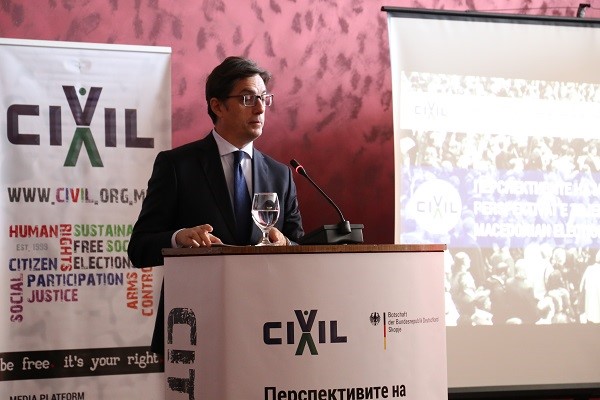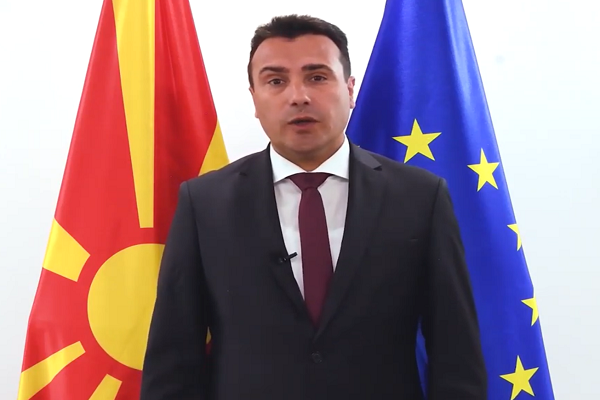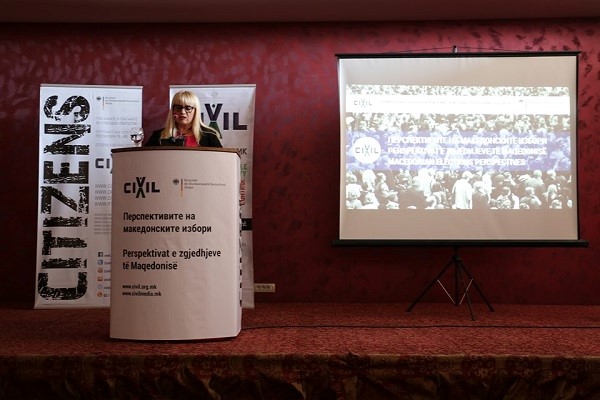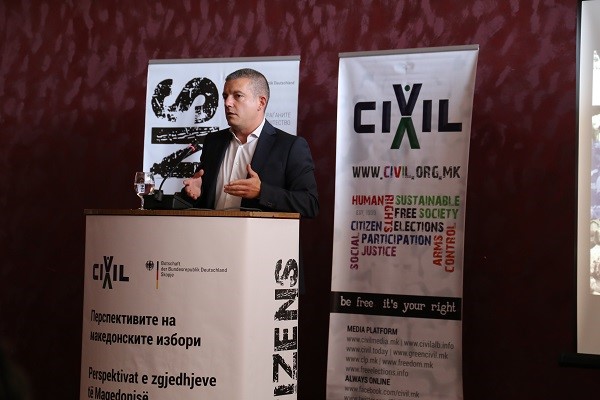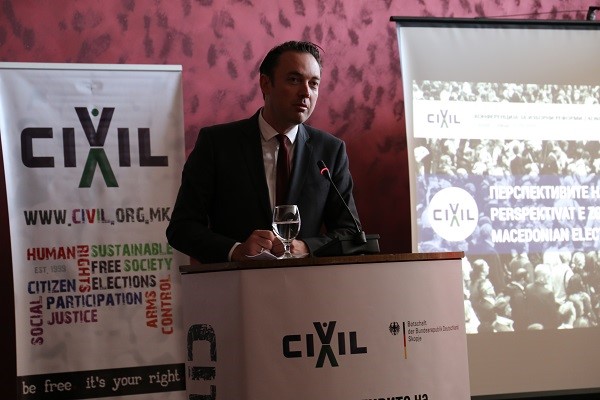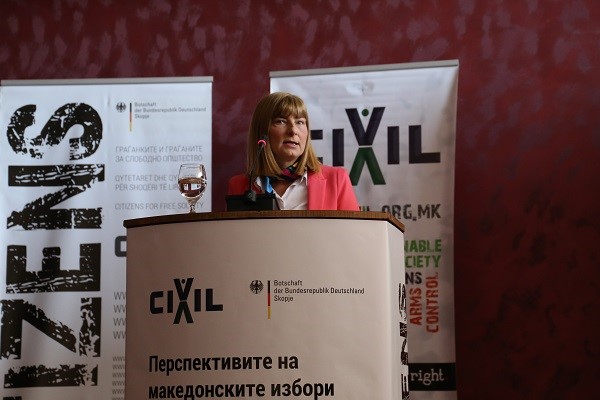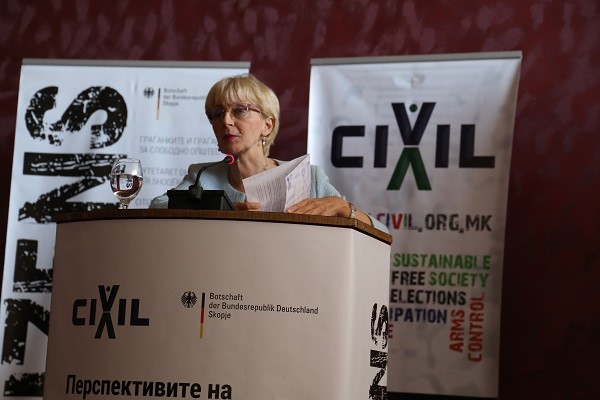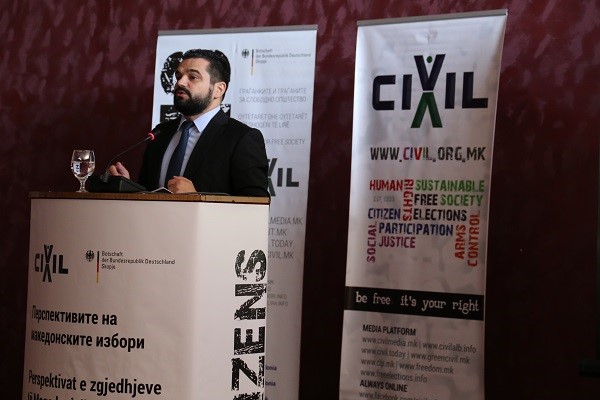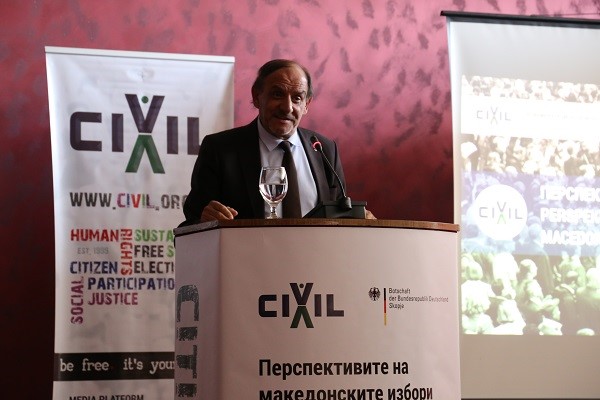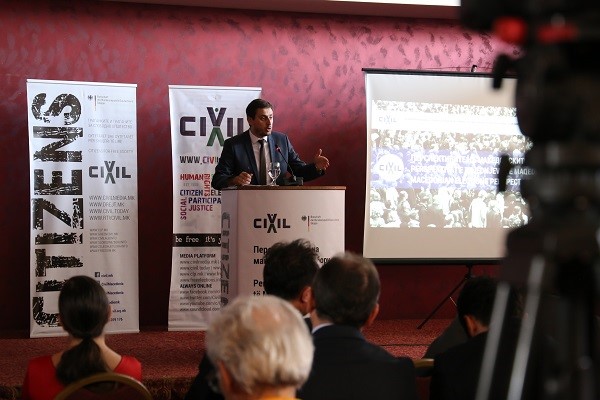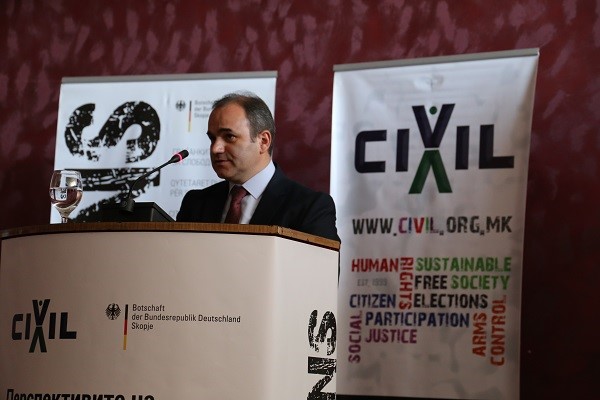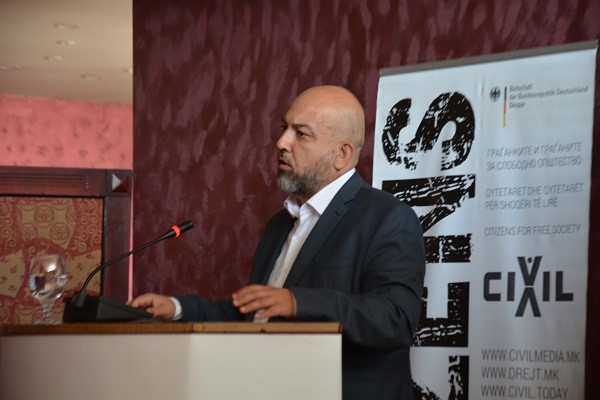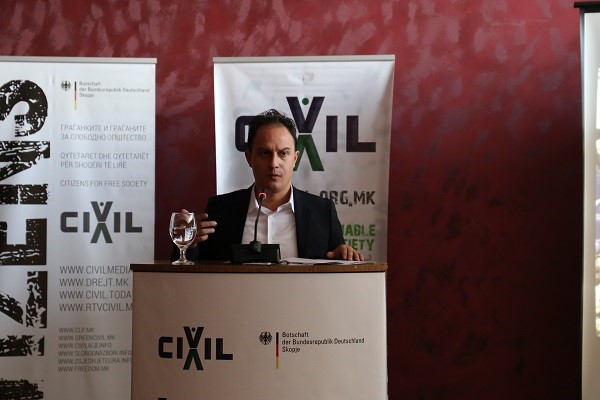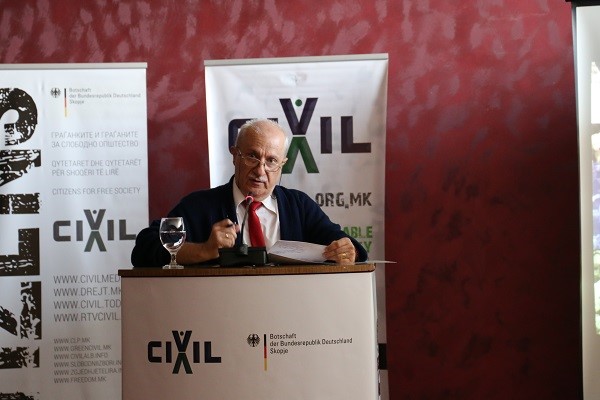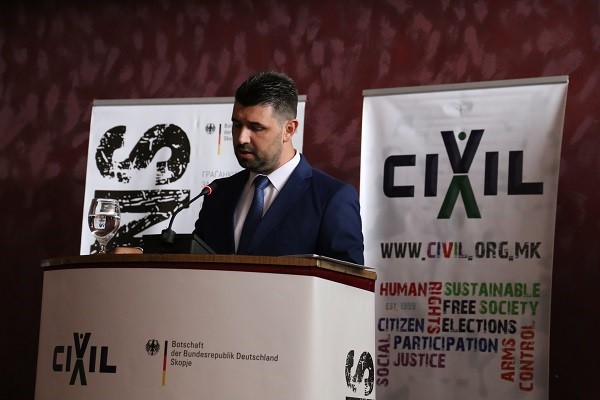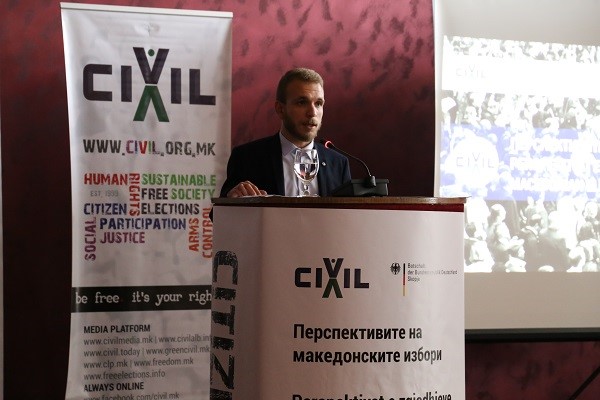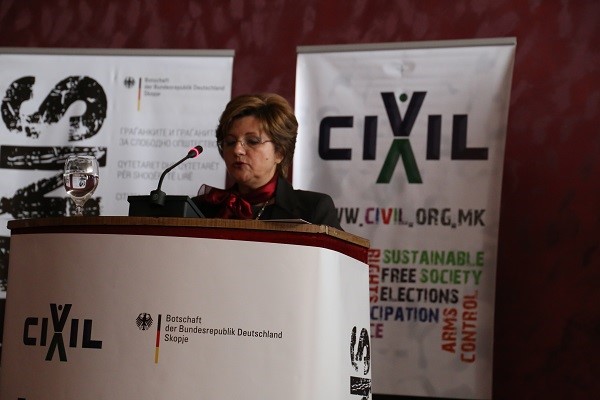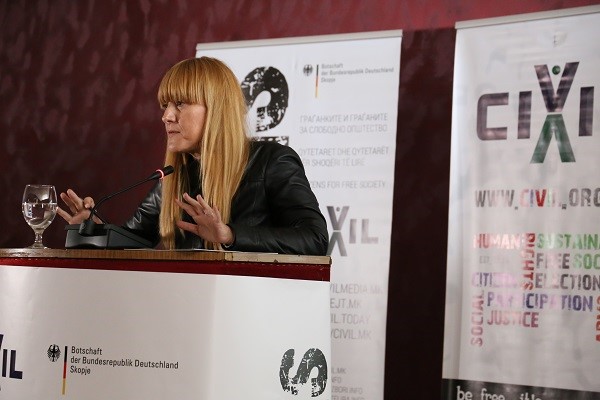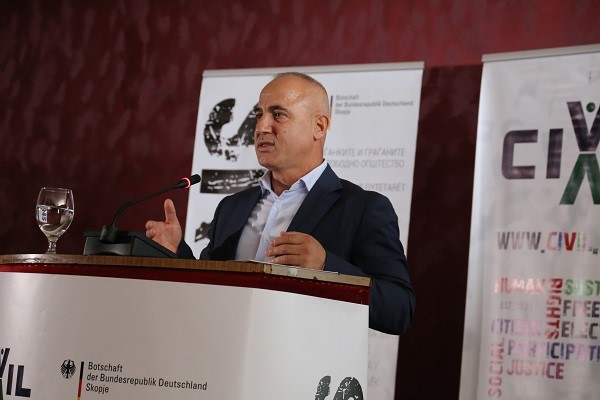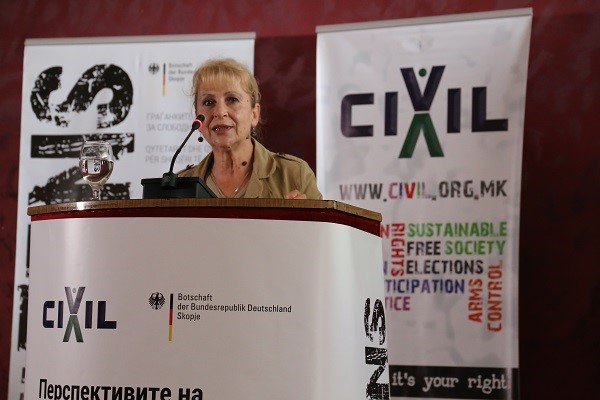Skopje, October 25th
CIVIL’s Conference on Elections Reforms: Macedonian Elections Reforms was followed live on the organization’s video channel. State top officials, ministers, leaders of political parties, experts and NGO’s participated in the conference. Prime Minister Zoran Zaev, who is in New York attending the 74th UN Session, addressed the Conference with a video message.
The Conference was announced by the President of CIVIL, Xhabir Deralla, after which the President of the Republic of North Macedonia, Stevo Pendarovski, opened the conference.
“This conference has two main goals. To continue our joint efforts to build an electoral system in a country of educated voters, which implies inclusion of everyone in society and the state, for everyone to have equal opportunities, not just to participate in the election processes, but to create the electoral system. The system does not belong to the big and powerful, but to the citizens. The second goal is for us to collect, in one place, relevant ideas for specific solutions on elections reforms at this conference, and in the period after this conference, to work together, inclusively, to give rhythm and contents to the electoral reforms”, stated Deralla.
Pendarovski: There is no single model for better functioning of the democratic political system
The President of the Republic of North Macedonia, Stevo Pendarovski, at today’s Elections Reforms Conference: Macedonian Elections Perspectives, in his address before the participants highlighted that it is particularly important to discuss such an issue as the elections, but also that democracy is much more than elections.
Premature, too frequent and reforms for which there is no consent from the opposition are worse that keeping the existing model. One thing is sure, there is no single model for better functioning of the democratic political system, said President Stevo Pendarovski at the opening of the Conference.
“Real democracy is not possible without free elections, they are its beginning without which it is impossible, a key legitimacy. We have various experiences with the election processes. The first and second ones, with their electoral model, enabled greater competitiveness. Critics of the existing model consider that its effects are in the greater centralization, little room for intra-party decision-making, clientalism. Though, low level of political culture cannot be brought down to the electoral model alone. We were also able to see that even with a relatively peaceful election day there can still be massive manipulations with the citizens’ will”, said Pendarovski.
Zaev: The citizen’s voice is the core of democracy
Prime Minister Zoran Zaev, through a video message addressed the participants of the Conference “Macedonian Elections Perspectives” and expressed confidence that the discussion will result in constructive guidelines for the legal and institutional framework for the electoral system, which the Government will take into consideration with special attention.
“I am convinced that from your contribution, constructive guidelines for the legal and institutional framework for the electoral system will result, on a transparent and inclusive basis. I assure you that I, as a Prime Minister, and the Government of the Republic of North Macedonia, will review and analyse the conclusions that will come from you. We are bound by the recommendations of the OSCE/ODIHR and Venice Commission to do so, which for this topic were in the direction of opening a comprehensive debate”, stated Zaev.
The Prime Minister added that as evidence to their efforts for introducing as many as possible democratic solutions to the electoral system is also the cooperation with the civil society sector, and with the international community, who he thanked for the significant technical and financial support to these processes.
“For these processes to truly be successful, all parties that are represented in Parliament need to show readiness to participate in these reforms. The voice of the smaller non-parliamentary parties is also important. Every constructive voice should be heard. As always, we are open for dialogue in favour of maximally democratizing the election processes in the Republic of North Macedonia. Through debate and analyses to receive the best guidelines for a model and legal solutions that will be most suitable for us to strengthen the parliamentary democracy with people’s representatives representing the interests of various communities in our country” added Zaev.
Gerberich: Joint cooperation is needed for a European future
Н.Е. Ambassador of the Federal Republic of Germany, Thomas Gerberich, in his introductory speech at the Conference on Elections Reforms: Macedonian Elections Perspectives, stated that it is high time for our society to unite and for all ethnicities to cooperate closely with the purpose of overcoming divisions.
Today / tomorrow (tbc) the German Parliament, the Bundestag, will decide about the vote for the start of EU-accession talks for North Macedonia and Albania at the EU Council in October. I’m certainly optimistic that the decision will become positive. And then we are all waiting for the decision of the EU Council and I remain more than optimistic that also there will be a clear decision to open EU accession talks with North Macedonia. Despite all the difficulties and shortcomings still existing North Macedonia now has created a success story at the Western Balkans especially with regard to bring the region closer together. North Macedonia has currently no problems with its neighbours; North Macedonia has made a great difference of historical dimension with the Prespa-Agreement. That should be an example for the whole region”, stated Ambassador Thomas Gerberich.
He added that apart from the foreign policy success, it is now important to further deepen the reform process and to implement reform laws previously adopted by parliament, including also with the opposition's votes.
“These efforts need to be stepped up to deliver tangible results for every citizen. And these efforts must include also the reform of the election process. For that aim the society – and this applies all parts of your society including all ethnicities - must come together and work together closely to overcome the still existing and sometime increasing division of the society. At this point I would like to pay tribute to the role of President Pendarovski, whose motto is always that he is a president for all. The particular themes that you’ll be discussing in your conference today are also central parts of the EU integration process in the forms of multifaceted support from those institutions as well as expectations for progress toward accession”, stated Ambassador of the Federal Republic of Germany, Thomas Gerberich.
Deskoska: We are starting new talks on amendments to the Electoral Code
The Ministry of Justice will renew the discussions with the working groups for amending the Electoral Code, announced Minister of Justice, Renata Deskoska, at the Elections Reforms Conference: “Macedonian Elections Perspectives”.
“A certain draft was prepared, in which we implemented the recommendations of the OSCE/ODIHR, but we did not have the replies of the political parties. Regardless of that, we will start new discussions. The new text of the Code will also include current issues such as open lists and a new electoral model, whereas the Ministry of Justice will be the mediator of the process”, said Deskoska.
She emphasized that the Ministry of Justice will not support a single reform for which there will be no consensus from the political parties.
Mancevski: The problem is not with the laws, the problem is that they are not respected!
Minister of Information Society and Administration, Damjan Mancevski, said that this ministry will be important in the following period in the organization of the elections, in the part of the Voters Register.
“How we can help? In the Ministry of Information Society and Administration the installation of an electronic register has completed, and soon will be put to use. It should solve the conflict in regards to the different data on citizens. This does not mean that we will be developing the Voters Register, just that we will help. The SEC continues to be responsible for the Voters Register, while this will just be a tool that will assist those preparing the Voters Register”, said Mancevski.
In regards to SDSM’s views, Mancevski highlighted that the party has quite clear positions in the area of the election reforms, which have been included also in the election program, and that he hopes that we finally have the conditions to fulfil that.
“We are efficiently discussing topics that we still find can improve the conditions. The first topic for which results were achieved was the consensus on the new composition of the SEC. The law in a draft form has been sent last year, but we still have no response from VMRO-DPMNE. There was a chance for it to be implemented until now”, says Mancevski, adding that everything that is in the direction of increasing civic rights and freedom is acceptable for SDSM. He then spoke about the law on financing political parties, for which he said that SDSM had agreed to under blackmail and pressure.
“This manner of financing a political campaign was accepted by us under blackmail. In the preparations for the referendum we didn’t have the composition of the SEC elected. We were conditioned to accept this way of financing, because otherwise there would have been no election of new members of the SEC. For VMRO-DPMNE the money was important!”, said Mancevski, calling on the representatives of VMRO-DPMNE to deny these statements.
Mancevski ended with the point that political will is important. “If a law can be adopted, if one wishes to manipulate with elections, then a way will be found for this. The laws are not such of a problem as is the problem of not respecting them. If we are not all dedicated in the process, it doesn’t matter what we agree. We should always fight for more”, concluded Mancevski.
Milevski: Local elections will have open lists
The next elections for municipal council members will be with open lists, for which we have political consensus, announced Minister of Local Self-Government Goran Milevski.
“Within the framework of the changes in the functioning of the local self-government, by New Year there should be new amendments to the Law on election of council members, for them to be elected with open lists. There is government consensus for this, the opposition announced that they have nothing against it. This will raise the quality of the municipal councils”, said Milevski.
LDP is also in favour of changing the electoral model. LDP is advocating for open lists and one constituency, a measure for democratization of society. Among the problems of the current Electoral Code, according to Goran Milevski, is also the advertising of candidate lists.
We consider that one constituency, open lists and not being allowed on a coalition, will represent the real situation in the country’, says Milevski.
LDP thinks that all parties should start from zero at election campaigns, and that no one should have advantage. As to the credibility of the voting, according to Milevski, the method of fingerprint identification of voters should be introduced, that is, returned. Regarding the polling stations, we shouldn’t allow for there to be only representatives of the big political parties.
Moracinin: Open lists mean greater personal responsibility for each MP
The President of the political party DOM, Maja Moracinin, outlined that open lists mean greater personal responsibility of each MP.
“There should be open lists also for the parliamentary and local elections, it would mean that citizens will not only be choosing which party they are going to vote for, but which candidate as well. Then the personal responsibility of every MP is even greater”, stated Moracinin.
She said that DOM has been advocating for years for a change in the electoral model with three key points: one constituency, open lists and equal number of men and women on the lists. She thinks that with one constituency, with a proportional model, democracy will be enhanced and citizens will be more adequately represented.
“A candidate now with 5-6 thousand votes may not win a seat in parliament, which means that those citizens who voted for that candidate will not have a representative in parliament”, outlined Moracinin.
Popovska: We are requesting a place in the process of amending the Electoral Code
MP Liljana Popovska from the same party said that the MPs who are requesting one constituency are also requesting a place in the process of amending the Electoral Code.
“Twelve representatives from the Initiative for one constituency are demanding to be included in the process of amending the Electoral Code”, she stressed as a representative of the Initiative.
“As MPs we are demanding to be included in the process of amending the Electoral Code. We have requested meetings with the President of Parliament, Talat Xhaferi, and with the biggest political parties. We think that as 10 percent of Parliament, we have a right to participate in this process”, said Popovska at the Conference on election reforms organized by CIVIL.
Loga: The Alliance supports open lists, but not one constituency
The representative of the Alliance for Albanians, Krener Loga, said that the party supports open lists, but not one constituency.
“We are against one constituency. There should be at least 8, and maybe even 10 constituencies. According to the Law on Territorial Division from 2009, we should have proportional representation, which we also advocate for”, says Loga.
The Alliance for Albanians, he stressed, is open for discussing all electoral models and considers that the current model is unsustainable.
“We think that not all of the units are realistically represented. Other interventions in the Electoral Code, when the threshold of 3 percent is increased to 5 percent, only increase disproportionality”, noted Loga.
Samka Ibraimovski: If it wasn’t for the bombs, we would have been a monarchy
“If it wasn’t for the bombs, we would have been a monarchy. People were leaving the country, voters of the party experts in election fraud were left. It’s no coincidence that building was built, for the monarch to climb upstairs and to waive to the people”, said MP from PCER, Samka Ibraimovski, at today’s conference.
“I will go on the ground, will play the match, who wins will go further. I want to face my people; to see what they think of me. Not because I am a Roma, but to see what those in Skopje and what those in Debar think of me”, says MP Samka Ibraimovski, one of the signatories of the Initiative for one constituency.
He thinks that the Voters Register does not have more than 1.300.000 voters, and insists that all parties need to participate in the process of amending the Electoral Code.
“That’s why I insist on one constituency. I believe that we will win more seats in parliament, and certainly I will know my political power and how the citizens expect us to act”, said Ibraimovski.
Bogojeski: The big parties are afraid of competition in a model with one constituency
“There is double fear of competition in the big parties with a one constituency model: first in regards to the lists, secondly in regards to the leaders. But that is a wonderful opportunity for the parties to make internal filtration and to leave it up to the citizens to choose the leader”, considers Petar Bogojeski, who, as he said, with his participation at the Conference is trying to promote “a normal opposition that will be discussing normal topics, and not just about the SPO”.
An opposition that can recognize the chance through initiatives of the NGO sector to start debating on important issues, he says.
“What is important for the big parties is that they showed extreme lack of a democratic concept, especially the party leaderships. Since we have a lack of that capacity, and a surplus of interests, in their interest in the direction of promoting one constituency is as follows: they are the biggest losers in 6 constituencies because thousands of votes are lost and are not valorised in mandates. This is also a chance for the smaller parties to concentrate their votes”, says Bogojeski. He emphasized that Europe goes a step further: it wants to make the European Union a single constituency.
Aliu: Alternativa demands open lists for more equitable representation
“We consider that the lists should be open with the sole purpose of having equitable representation”, says Lulzin Aliu from Alternativa.
He says that although the electoral models have changed over the years, they have never been equitable for all entities and for all citizens.
“If we have more than a quarter of citizens, members of the Albanian ethnic community, then this is not represented in Parliament. But with open lists the quality of the elected MPs will also increase. Often in Parliament citizens are represented by those who have failed in school, from the last rows in classrooms. Open lists will enable MPs to represent citizens in a more dignified manner”, says Aliu.
Rexhepi: Besa is for open lists, but for three constituencies
Besa thinks that the electoral model with a single constituency and with open candidate lists gives parties and candidates legitimacy and connects them with their electorate, that is, citizens, said Kastriot Rexhepi.
However, Besa considers that there should be three constituencies, for adequate geographic representation of citizens.
Rexhepi, along with several of his predecessors, says it would be good for representatives of the Ministry of Justice and the biggest parties to participate in such debates, who decide on the electoral model.
“It is very important to create an efficient mechanism for cleaning up the Voters Register, but to also enable voters who do not figure now on the Voters Register the democratic right to vote. The financing of the election campaigns came out incompletely defined. In the future, details need to be fully defined, and not to be according to the will of half of the parties. There always needs to be improvement of this process”, says Rexhepi.
NSDP: Let’s see how much one weighs
It’s time for us to change the electoral model, the current and the previous one have given their contribution, considers Vladimir Trajkovski from NSDP.
“We are advocating for urgent reforms of the electoral model and think that this model would be best for the smaller parties, because 20, 30 or 40 thousand votes would convert into mandates and they would have political weight. That way we would be able to see how much one weighs”, says Trajkovski.
He emphasized that changing the electoral model must not be a child’s game, but that experts, professors and academics have to be involved in the process.
“Democrats” demand mandatory voting
The “Democrats” advocate for changing into a majority model, introducing mandatory voting, in order to allow greater censorship, considers Ljubomir Krstevski, representative of the party.
The party also demands professionalization of the State Election Commission in order to exclude the possibility of political party members to be engaged in the commissions, furthermore, open lists and the inability for pre-election coalitions or the party affiliation after the verification of the MP mandates to be changed.
Krstevski also requested termination of paid political representation of candidates of parties that have significant financial funds, or to have equal funds given to all parties. He also demands for citizens not to be allowed to express their position on specific candidates in public opinion polls, which he considers violates the secrecy of voting.
GDU requests ballots with the option “none of the above”
The Civic Democratic Union advocates for open lists and one constituency, but also for a reduction in the number of representatives, both at the central and local level.
“The number of council members in the City of Skopje is 45. In the city of New York, it is 50”, stressed Petar Kolev from GDU.
The party advocates also for a change in the consensus, but also for the option “none of the above” in the ballots.
“United for Macedonia”: With one constituency each vote weighs the same
“United for Macedonia” is in favour of leaving the model of six constituencies, because with this model votes do not have the same weight, said party representative Gjorgji Stankovski, who also presented a simulation of the election results with another electoral model.
SCPC: Current way of financing parties is unsustainable
“The legal solutions slowly, but surely, are leading to permanent financing out of budgetary funds, with the biggest parties having the greatest benefit”, says Katica Nikolovska from the State Commission for Prevention of Corruption, who gave several examples on the possibilities of misusing party finances, especially during elections.
Only one of several parties included in her recent research on her website had financial reports, stressed Nikolovska.
“The fact remains that this manner of budget financing of party campaigns is not sustainable on the long run”, said Nikolovska. She explained the manner and the competencies of the SCPC and of the State Audit office in controlling the financing of parties, and pointed out the shortcomings and inability of these institutions to act.
“Is the reason for this manner of control not to have any control?”, asks Nikolovska.
Bacovska: It is necessary for politicians to be media literate, and for parties to increase their social responsibility
We have to have quality political communication, and for this, primarily, education on media literacy for politicians is necessary, but also raising the level of social responsibility of political parties, considers professor Jasna Bacovska, who at CIVIL’s elections reforms conference spoke about the problems with party abuse of the media, manifested, among else, also with the phenomenon of false news.
“If a certain portal is politically close to us, we shouldn’t misuse it, we must not harm society”, outlined Bacovska.
She says that paid political advertising is the easier part of the problem of the media representation of the parties.
“What is much more dangerous is the diffuse propaganda during elections, and that is the quality of the political communication. But this is not just a problem here, it’s a problem everywhere. However, in that area we have a slightly bigger problem because we don’t have quality media. In Britain, you can have all kinds of fake news, but at the end you will open the “Guardian”, says Bacovska.
“Here, with such portals, you see what is happening. We are completely defocused from the real problems, they are doing huge damage”, she said.
Nuredini: One constituency, open lists without a threshold
Supporting the initiative for a change in the electoral model, Azbi Nuredini from the “Initiative for civil rights”, spoke about election violence, illustrating it with an example from personal experience in election cycles.
He requested changes in the electoral bodies that should guarantee, among else, also peace in the election process.
Dimitrovska: We demand equality for disability persons in the election processes
Blagica Dimitrovska from “Inkluziva” said that our country seemingly is democratic, because everyone has the right to participate in the political process, except people with disabilities.
“We have a legal system where one group of citizens are deprived of the right to choose, and they are citizens with disabilities, which directly discriminates. We will not stand silent about this, because they are losing the right to vote with their deletion from the Voters Register”, says Dimitrovska.
Dimitrovska added that Macedonia still has no MP with a disability.
“Where is the respect for diversity? They are also people with the same rights and we cannot look at them with pity, they have no access to information, communication, equal right to vote, their vote is abused, ballot boxes are filled on their behalf!”, added Dimitrovska.
“As we speek about equality for men and women or ethnicity, we demand equality of people with disabilities who want to work equally like all citizens, we who have no disabilities lack many things, that is, the desire for our country to move forwards”, said Dimitrovska.
Igor K. Ilievski / Маја Ivanovska / Angela Petrovska
photos: Biljana Jordanovska / Goran Naumovski / Angela Petrovska
translation: Natasa Cvetkovska
 Македонски
Македонски Shqip
Shqip English
English

